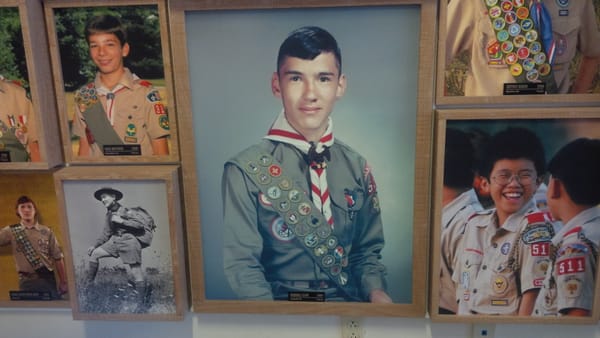10 ideas to make LGBTQ+ scouts feel more welcome
Steal, borrow or adapt these strategies to make your corner of Scouting a little more gay-friendly.
Over the past few years of writing this newsletter, I’ve done my best to collect and highlight success stories from local leaders who are passionate about diversity, equity and inclusion work.
But from those individual stories, I’ve noticed some consistent strategies for making LGBTQ+ youth feel welcome in Scouting. Below are 10 of those ideas that you can steal, borrow or adapt to make your corner of Scouting a little more gay-friendly.

1. Advertise your unit or council as an affirming and inclusive environment.
This may sound obvious, but it’s sometimes very difficult for LGBTQ+ scouts to figure out which units might be more accepting than others.
Consider revamping your troop’s website and social media presence to be explicitly inclusive of diversity. Maybe swap gendered terms like “mother” and “father” to more neutral ones like “scout leader” or “adult.” Try including more photos of people of color, disabled or visibly queer scouts. And don’t be afraid to extend an open invitation to LGBTQ+ youth who may be interested in joining your unit.
2. Participate in a Pride parade or event
One of the most visible and effective ways to communicate inclusivity of LGBTQ+ scouts is to participate in a Pride parade or event.
Last month, I wrote an entire guide for how to march at Pride with your Scouting unit. The takeaways: Let the youth lead the way; don’t get too caught up with uniform rules; and if you’re unsure of your place in Pride, try offering to serve as the color guard.
3. Wear a pronoun pin or Inclusive Scouting Award
A lot of scouters make a habit of wearing name tags on their uniforms. Why not also wear a pronoun pin, or better yet, add pronouns to your name tag?
Another easy uniform add-on is the Inclusive Scouting Award, a rainbow knot patch that’s distributed by the Inclusive Scouting Network.
4. Host an LGBTQ+ affinity space at your next event
Many of you were captivated by the LGBTQ+ affinity space held this past summer at the National Order of the Arrow Conference.
While that space was the product of years of planning, you can do something smaller and equally effective on a local level. It can be as simple as a table or booth at the next council or lodge event.
No matter the size, creating a space where LGBTQ+ scouts know they are safe and welcome is sure to create a big impact.
5. Make the most of the Citizenship in Society merit badge
I’ll be the first to highlight the shortcomings of the Citizenship in Society merit badge, the BSA’s attempt at creating a DEI-focused badge.
But despite a thin curriculum, scouters around the country are using it as a platform to create inclusive and welcoming environments. Last year, I highlighted a few examples of merit badge counselors who are doing just that.
6. Select diverse leaders, build diverse teams
I’m taking a page out of the OA’s DEI commitment here: When you’re selecting leaders or creating teams at the local level, aim to build a group that reflects the diversity of your community.
Representation and visibility are important, and can show an LGBTQ+ young person that there are other scouters like them who are embraced within the program.
7. Make sure your summer camp facilities accommodate girls and trans scouts
It’s easy to overlook the small changes that make people feel welcome in a camp environment. If your council hasn’t done so already, advocate for things like single-occupant shower stalls and stocking feminine hygiene products at the trading post.
Camp staff should also be trained on LGBTQ+ inclusion, and again, should consider wearing pronoun pins or name tags.
8. Partner with a local LGBTQ+ support center
You don’t have to do this all on your own. A council in Texas, for example, has had huge success partnering with LGBTQ Saves, a local youth services organization.
Creating that kind of partnership can give your unit more credibility, and an easier entry point into Pride events and other queer community spaces.
9. Include DEI themes in your scoutmaster’s minute
This is a suggestion from Kenneth P. Morrison, president of the Northeast Illinois Council, who wrote a guest essay for me last year.
The scoutmaster’s minute is an opportunity for an adult leader to promote positive values for scouts. Why not integrate themes of diversity and inclusion once in a while?
10. Use your Wood Badge ticket to promote inclusion
Wood Badge, the training course for adult volunteers, asks attendees to develop five goals that will build leadership skills and ultimately improve the Scouting program. One of those five goals is actually required to be diversity related, and many scouters use that piece of their project to promote LGBTQ+ inclusion.
A few examples I highlighted back in 2021: Educating adults in your council on LGBTQ+ basics; creating a directory of LGBTQ-inclusive units in your area; setting up a table at Pride; and using social media to promote inclusive Scouting.
What did I miss? Throw in your suggestions in the comments below!


